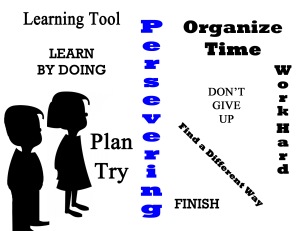
Each new day comes
With its prizes unassembled.
Be handy with your tools.
Author Unknown
By Persevering
What are the tools that help us learn and grow? Do you have them? Can we help our children get them? The abilities to actively listen, observe carefully, and analyze information help us in our daily lives. They are all important, but maybe THE most important is PERSEVERING. One way to help children learn to persevere is to talk to them about it. Explain what it means and give them examples of famous people who, by persevering reached their goals. But don’t just use famous people, give examples of how persevering helped you and other people they know, as well. And talk about it often. Slip it in, maybe with a good quote whenever it seems reasonable. (Be ready to get your own advice back when your kids are grown. So they obviously listened to you, right? I sometimes hear reminders from my sons when I express doubts about completing my goals.)
I’ve always liked using quotes and passing them on to kids. In his article 28 Inspiring Quotes About Perseverance and Persistence,” Michael Pollack has collected some great quotes you might like to use. In fact, one of the reasons I’m writing these posts is that my son reminded me that I’m always sending quotes to him and his brothers and I should share some of my ideas on a blog. I also come by this naturally, as my mother often had little quotes and sayings she told us. I remember her favorite about persevering: “If first you don’t succeed, then try, try again.” I just googled that and found it can be credited to several people, one being an American Educator named Thomas Palmer(1782-1861) who used it to encourage students to do their school work.
Other ways to help children learn to persevere is to give them time to do what they are trying to complete and help them learn to organize and plan for the time they need. No matter if it is a toddler working on a tall tower, or a fourth grader struggling through essay writing, don’t be too quick to jump in and do it for them as a way of helping. Listen to what they are saying, encourage them to try, give suggestions for strategies, help them find resources that are helpful, but give them time to ponder and solve the problems they encounter. Sometimes we get so rushed and/or so involved that we think doing the job for the child is a help. It isn’t. Not if we want them to develop tools for their own lives.
“Keep trying, keep trying. I like that you aren’t giving up!”
Allow them a place and time to leave an incomplete project to go back to later. We have all benefited from tackling a hard or complicated problem after a bit of rest from it. That statement above about helping them learn to organize and plan for the time they have is important here. Learning how to complete tasks is important, so we have to organize and plan.
“How about working on that again. A little time here, some more time there. Keep trying, keep trying.”
Encourage children to consider dividing a difficult task into parts. It may be easier to complete it that way. Each part completed will give a feeling of accomplishment. And, we need to remind children, (and ourselves) that we all fail, and we may need to try, try again and, maybe in different ways, to get something done that is important to us. Julie Andrews said: “Perseverance is failing 19 times, and succeeding the 20th.”
Don’t forget to praise. Not for just getting the task done, or learning something that took lots of practice, although this certainly would be praiseworthy, but most of all for sticking to it, for doing the work, for adding the tool of persevering to their tool box.
“You really worked hard on that!”
“Look Mom,” says Dad, “ Junior is almost finished with that, he’s really sticking to it!”
6 Tips For Persevering
Help your children add PERSEVERANCE to their tool box.
- Talk to them about persevering, explain it, give examples.
- Give them time to work, help them learn to plan and organize their time.
- Make a safe place for them to leave a project while they are working on it that won’t be invaded by pets or siblings.
- Encourage them to divide a difficult task into parts.
- Remind them that everyone fails at times. Help them expect to learn from failures. We try again or we do something differently.
- Praise them for persevering.
What is something you persevered at and completed? Share those examples with your children. We’d like to hear about them, too.
Read our other posts on helping your child acquire tools for learning.
#10 – Tools For Learning – Active Listening
#11 – Tools For Learning – Observing
#12 – Tools For Learning – Analyzing
